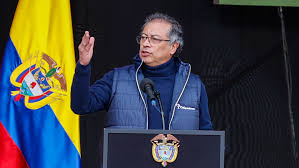
Colombia’s Council of State Halts Petro’s Labour Reform Referendum

 :
| Updated On: 19-Jun-2025 @ 12:10 pm
:
| Updated On: 19-Jun-2025 @ 12:10 pmSHARE
Colombia’s Council of State has suspended a decree issued by President Gustavo Petro that aimed to call for a referendum on his proposed labour reform. The court's decision was based on the absence of Senate authorization, a requirement under Colombian law for initiating referendums. Petro, who came to power in 2022 with promises to address deep-rooted inequality in the Andean nation, had bypassed legislative opposition by signing a decree to take the reform to a popular vote scheduled for August. The move was widely criticized as unconstitutional and a threat to the separation of powers among Colombia's executive, legislative, and judicial branches.
The suspended referendum decree sought public approval for a package of labour reforms central to Petro’s social justice agenda. These reforms included establishing an eight-hour daytime work limit, higher wages for weekend and holiday work, and mandatory social security contributions from delivery app drivers — key elements meant to strengthen labour rights and expand protections for informal and gig economy workers. However, many of Petro’s proposed social and economic reforms have faced strong resistance from Congress, which has rejected the majority of them.
Critics, including members of the political opposition, argued that the president’s decree violated Colombia’s Political Constitution. They stressed that only Congress has the power to authorize referendums and warned that allowing the president to unilaterally call one would undermine the checks and balances of the country’s democratic institutions. According to Colombian law, a national referendum can only proceed if endorsed by the Senate. Additionally, for a referendum to be valid, each proposal must receive approval from at least 13.5 million voters — roughly one-third of the electorate.
Opposition parties also accused Petro of using the referendum as a political strategy to boost his party’s popularity ahead of the 2026 general elections, in which Petro is constitutionally barred from seeking a second term. They argued that the costly referendum was more of a political stunt than a genuine attempt at democratic engagement.
Despite the suspension of the referendum, there has been progress on the legislative front. On Tuesday, the Colombian Senate approved a revised version of the labour reform bill after extensive debate. The bill passed with 57 votes in favour and 31 against. This marked a turnaround from April, when the Senate had previously rejected the bill. Petro’s renewed pressure — including his threat to put the matter to a referendum — is seen as a key factor in reviving and reshaping the bill for legislative approval.
The president’s office described the bill as “a historic step toward decent work,” emphasizing its importance in improving labour standards. Petro’s supporters have rallied behind the reform, holding demonstrations in the capital Bogotá and other major cities to show their support for his labour policies.
Meanwhile, the country is facing a wave of violence that has raised concerns about political instability. In recent weeks, bombings in Colombia’s southwest killed seven people, and there was an assassination attempt on conservative opposition senator and 2026 presidential hopeful Miguel Uribe Turbay. These events have reignited fears that Colombia could slide back into an era marked by political violence and unrest.
Contact Us
House. No. : 163, Second Floor Haridev Rd, near Puberun Path, Hatigaon,Guwahati, Assam 781038.
E-mail : assaminkcontact@gmail.com
Contact : +91 8811887662
Enquiry
×
Reporter Login
×